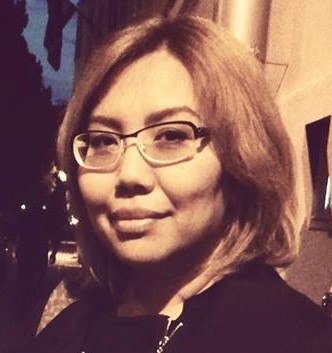
Human rights defender's story: Lira Ismailova from Kyrgyzstan
Lira Ismailova, from Bir Duino Kyrgyzstan, advocates against restrictive laws and Russian influence, striving to safeguard civil society space and support human rights defenders.
Lira Ismailova credits her mother, Tolekan Ismailova – a celebrated Kyrgyz human rights defender, with influencing her path into the field of human rights. Lira, previously a lawyer advocating for a wide range of human rights related issues, currently works at Bir Duino Kyrgyzstan – which focuses on defending freedom of association and protecting human rights defenders in Kyrgyzstan.
‘My first position in the field of human rights was with an NGO working for the protection of the rights of internal migrants. I then advocated for the repeal of the death penalty in Kyrgyzstan. I participated in a working group to prepare a draft law for reforming our criminal legislation, and on several reforms for the penitentiary system which included monitoring prisons in Kyrgyzstan.’
Lira’s work on the death penalty was ultimately successful in 2007 when President Bakiyev abolished the death penalty. However, this achievement did not herald a significant practical improvement in the human rights situation in Kyrgyzstan. Instead, since then, it is ‘much more difficult’ for human rights defenders on the ground.
Worsening situation for human rights defenders
Lira recalls numerous occasions when she and her family had to temporarily leave Kyrgyzstan for safety reasons.
Lira highlighted the restrictions imposed on Bir Duino’s operations and recalled that its Kyrgyzstan office has been burgled twice in connection with attacks on ‘nationalists’. Bir Duino’s activities were also ‘supervised’ by authorities during the trial of well-known human rights defender Azimzhan Askarov in 2013 who is currently serving a life sentence in a Kyrgyz prison despite continued legal efforts by Lira’s organisation.
Lira considers that the Kyrgyz government’s moves to create new restrictive legislation, along with the State Committee for National Security putting direct pressure on lawyers and human rights defenders, has added to the shrinking space for civil society. One of the laws focuses specifically on limiting the funding, activities, and accreditation of human rights NGOs, and the other on banning ‘promotion of non-traditional sexual relationships’.
‘It’s very difficult. Our parliament is following Russia’s lead and trying to adopt several laws which impose restrictions on civil society, including legislation which is based on that established in Russia.’
The issue of Russian Federation’s influence on Kyrgyz society and politics is of great concern to Lira. She considers it as a crucial focal point for her international advocacy.
‘We need help from international institutions to raise awareness of the Government’s attempts to implement these restrictive laws and help us to stop these laws from passing in Parliament’
A call for international support
‘The political space for human rights organisations is further limited due to Kyrgyzstan joining a trade bloc with Eurasian economic powers, so the influence of Russia is growing step by step’
The Eurasian Economic Union is ostensibly a trade agreement, but Lira echoes the concerns of other Eastern European and Eurasian human rights defenders that the Russian Federation will use it as a means of applying social and political pressure.
The Russian influence is already being felt within civil society, with Kyrgyz human rights defenders suffering constraints under these new restrictive laws.
Given that international support has heeded positive results in the past, Lira stresses the need for international pressure to curb the expansion of Russian influence in Kyrgyzstan, and hopes that this is an area where the UN can contribute.
According to Lira, it is critical that, among other international mechanisms, the UN Special Rapporteur on the situation of human rights defenders visit Kyrgyzstan. Some of the main aims of such visit would be to observe the effect of Russian-derived legislation on civil society space and support human rights defenders, such as Askarov a defender who needs urgent humanitarian aid.
‘Given the Government’s move to restrict civil society space, we need to act immediately to protect our civil rights before they are further restricted. To do this effectively, we need help from the international community’
Lira adamantly talks about what needs to be done in Kyrgyzstan – the Government needs to ensure the protection of human rights defenders in accordance with the UN Declaration on human rights defenders; ensure that national legislation complies with this Declaration, including by repealing legislative barriers to obtaining financial resources, independence, freedom of association, assembly and expression; and create a parliamentary committee on observance of the situation with the human rights defenders.
Follow Bir Duino on Twitter at @BirDuinoEnglish.
